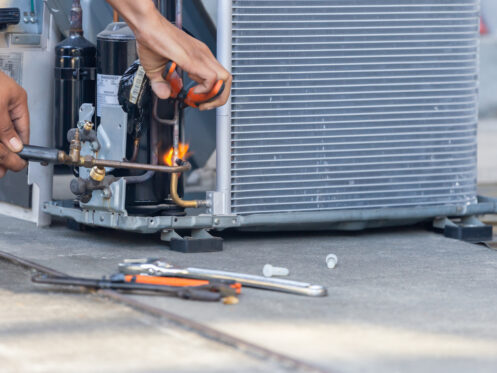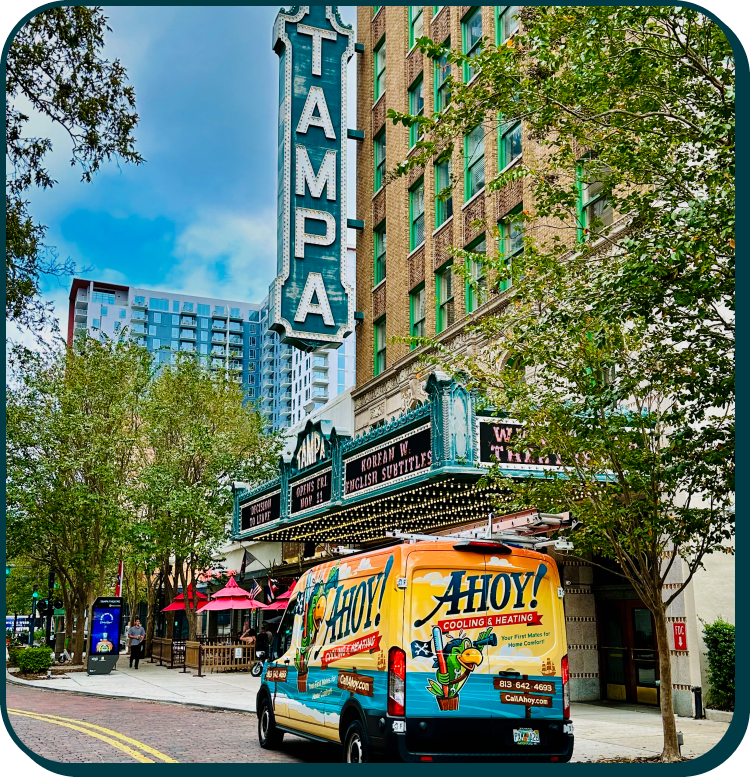When a hurricane blows through Tampa, the immediate aftermath is usually focused on visible damage—broken windows, debris, or roof damage. But what about your air conditioning system? Even if your AC appears to be functioning normally, there could be hidden issues lurking beneath the surface that, if left unchecked, can lead to costly repairs or a complete system failure. As your local HVAC expert, I’m here to help you spot the hidden signs of AC damage after a hurricane, so you can keep your home comfortable and avoid bigger headaches down the road.
1. Unusual Noises Coming From Your AC
If your AC is making noises you’ve never heard before, don’t ignore them. Hurricanes can cause debris to get stuck inside the system, or winds may have damaged internal components.
Common noises to watch out for:
- Grinding: This could indicate motor issues or debris caught in the fan.
- Buzzing or Humming: A sign that electrical components may have been affected by the storm.
- Clanking: This often means that parts inside the unit have come loose, which could be due to strong winds shaking the system.
If your AC is making any of these noises, it’s a good idea to have a professional check it out before it leads to a bigger problem.
2. Weak Airflow
Weak airflow might not seem like a huge issue right away, but it’s one of the telltale signs that something’s not right with your AC after a hurricane. The storm may have caused blockages in the ductwork, clogged air filters, or damaged components inside the system, leading to reduced airflow.
What to check:
- Air Filter: Your air filter could be clogged with debris blown in by the storm.
- Ductwork: High winds or water damage can cause leaks or blockages in your ductwork, reducing the efficiency of your AC system.
- Evaporator Coils: If water made its way into the system, it could cause the coils to freeze or corrode, resulting in weak airflow.
If you notice that your AC isn’t blowing as strongly as it used to, this is a sign that something needs attention.
3. Unexplained Spikes in Your Energy Bills
One of the more hidden signs of AC damage after a hurricane is a sudden and unexplained increase in your energy bills. Even if your system seems to be working fine, it may be operating less efficiently due to hidden damage.
Why your bills might spike:
- Electrical Damage: Hurricanes can cause power surges that damage the electrical components of your AC, forcing it to work harder to maintain the temperature.
- Refrigerant Leaks: If the refrigerant lines were damaged, your system may be running inefficiently, consuming more energy than usual.
- Duct Leaks: High winds can loosen or damage ductwork, causing cooled air to escape and forcing your system to use more energy to cool your home.
If your energy bills are higher than normal after a storm, it’s worth having your AC system inspected to ensure everything is running as it should.
4. Water Damage Around the Outdoor Unit
Even if your outdoor unit appears fine, water damage might be lurking in places you can’t immediately see. Flooding or heavy rain can cause water to seep into the electrical components of your AC unit, leading to corrosion or electrical shorts.
What to look for:
- Puddles Around the Unit: If you notice standing water around your outdoor unit, it’s important to have it checked out. Water can damage the electrical connections or even the compressor.
- Corrosion: Water inside the unit can cause parts to rust and corrode, leading to bigger issues down the road.
- Mold or Mildew: Excess moisture around or inside the unit can lead to mold and mildew growth, which can spread through your ductwork and impact indoor air quality.
Flooding and moisture can cause serious long-term damage, so if your outdoor unit was exposed to water, it’s best to call a professional to assess the damage.
5. Inconsistent Cooling
Is your home suddenly feeling warmer in certain rooms, even though your AC is running? Inconsistent cooling can be a sign that your system has been compromised during the storm.
Possible causes:
- Refrigerant Leaks: Damage to the refrigerant lines can cause uneven cooling, with some rooms feeling cooler than others.
- Duct Damage: The high winds or debris from a hurricane can cause tears or blockages in your ductwork, leading to inconsistent airflow throughout your home.
- System Overload: If your AC was running during the storm, it may have been working harder than usual, leading to stress on the system and uneven cooling performance.
If you’re noticing hot spots in your home, it’s a good idea to have a professional check your system for hidden issues.
6. Strange Smells Coming From the Vents
If you notice any strange odors coming from your vents after a hurricane, don’t ignore them. These smells could be a sign of serious issues within your HVAC system.
Common smells to watch for:
- Musty or Moldy Smells: This could indicate mold or mildew growing in your ductwork or inside the unit, especially if there was water intrusion.
- Burning Smell: If you smell something burning, it could be a sign of electrical damage caused by a power surge or water damage to the wiring.
- Rotten Egg Smell: While rare, a rotten egg smell could indicate a gas leak, which needs immediate attention from a professional.
If you detect any unusual smells coming from your HVAC system, it’s essential to get it checked by a technician right away.
7. Your AC Won’t Turn On
This might seem like an obvious sign, but if your AC won’t turn on after a hurricane, there’s likely hidden damage that needs to be addressed. Power surges, debris, or water damage can prevent your system from starting up.
Possible reasons your AC won’t turn on:
- Electrical Issues: Power surges during a storm can cause circuit breakers to trip or damage the electrical components in your system.
- Debris Blockage: Debris can block the fan or other parts of the system, preventing it from turning on.
- Water Damage: If water entered your outdoor unit, it may have caused a short circuit or other electrical damage that’s preventing the system from working.
If your AC won’t turn on, it’s crucial to call a professional to inspect the system and diagnose the issue.
We Are Here For You!
Hurricanes can do more than just surface damage—they can leave hidden issues in your AC system that may not be immediately obvious. By knowing what to look for, you can catch these problems early and avoid costly repairs later on. If you’ve experienced a hurricane and suspect your AC might have hidden damage and need repair, don’t hesitate to reach out to Ahoy! Cooling & Heating. Hurricanes can be costly, so if you need a new system turn to our financing upon approved credit. We’re here to help the Tampa area homeowners get their HVAC systems back in top shape, keeping your home cool and comfortable.

